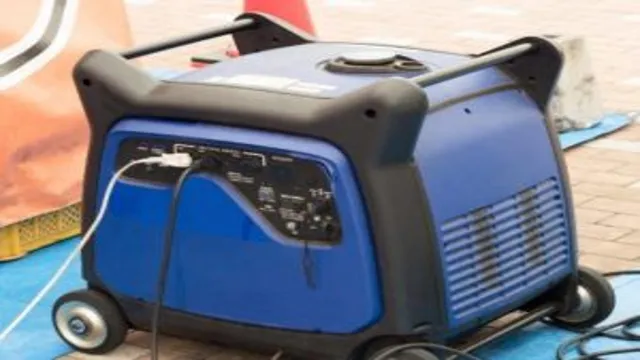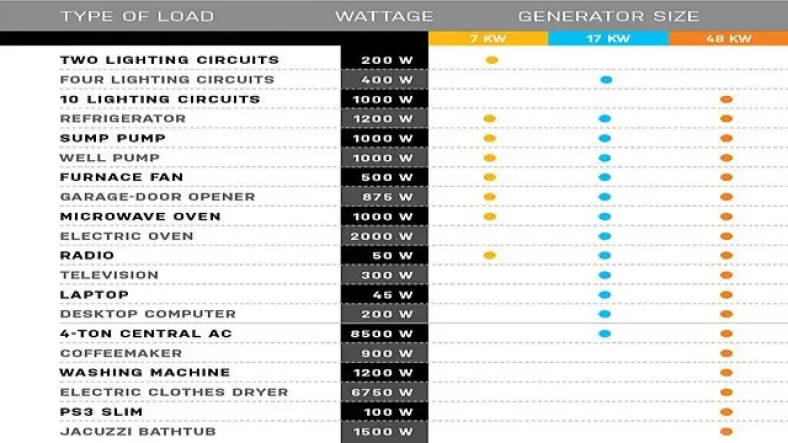If you’re considering purchasing a generator for your 2000 sq ft house, you’re probably wondering what size you should get. After all, you want to make sure your generator is powerful enough to keep your lights on and appliances running during a power outage. There are a few factors to consider when choosing a generator size, such as the size of your house, your power needs, and the types of appliances you want to power.
Don’t worry, though, we’ve got you covered. In this blog post, we’ll explore what size generator you need for your 2000 sq ft house and provide some helpful tips to make sure you select the right generator for your home. So, let’s dive in!
Factors Affecting Generator Size
If you’re wondering what size generator is suitable for a 2000 sq ft house, there are numerous factors to consider. Firstly, you should assess the power needs of your house. The bigger the house, the more power it’ll need to keep it running smoothly.
Secondly, you must take into account the wattage of all the appliances and electronic devices you want to power up. If you plan to run air conditioners, central heating, or water heaters, it requires more power. Lastly, you should check the generator’s capacity in terms of amps and volts.
Generally, a 2000 sq ft house will require a generator with a capacity of at least 5000 watts to 10,000 watts. But it’s essential to reach out to a professional electrician who has expertise in generator sizing to ensure that you invest in the right generator size suitable for your house.
Power Consumption of House Appliances
When it comes to determining what size generator to get for your home, various factors need to be considered, such as the number of appliances and electronics you need to power. You also need to consider the power requirement of each appliance or device as this will affect the overall amount of power that your generator needs to produce. For instance, some high-powered appliances such as air conditioners or heating systems will require more wattage than smaller electronics like smartphones or lamps.
Additionally, the length of time you need backup power is another factor to consider. If you only need power for a few hours, a smaller generator would suffice, but if you anticipate longer power outages, then a larger sized generator would be necessary. Ultimately, determining the appropriate size of a generator will depend on your specific needs, and it’s best to consult with a professional to ensure that you get the right generator for your home.

Climate and Weather Conditions
One key factor that impacts generator size is the climate and weather conditions in the area where the generator will be used. Hotter climates may require a larger generator since the heat can decrease the efficiency of the generator and increase the load it has to handle. Similarly, if the area is prone to frequent power outages due to storms or extreme weather conditions, a larger generator may be necessary to ensure consistent backup power.
Additionally, if the area experiences frequent power surges or brownouts, a larger generator may be needed to handle the fluctuations in voltage. Ultimately, understanding the climate and weather patterns in the area where the generator will be used is critical in determining the appropriate size and capacity of the generator to ensure reliable backup power.
How to Calculate Generator Size
If you have a 2000 sq ft house and are considering purchasing a generator, you’ll need to determine what size generator you’ll need to power your home. The size of the generator you require will depend on several factors. When calculating generator size, you’ll need to consider the total power requirements of your appliances and electronics.
You should also consider the starting current required for the largest appliances, such as air conditioning units and refrigerators. The general rule of thumb for a 2000 sq ft house is to have a generator with a minimum of 5000 watts of power. However, if you have more appliances or large electrical devices, you’ll need to increase the wattage accordingly.
It’s always better to have a generator with too much power than not enough, as it will provide a more reliable backup power source in case of an outage.
Step 1: Calculate Total Wattage
To determine the appropriate size of generator for your needs, the first step is to calculate the total wattage required. This essentially involves adding up the individual wattages of all the electrical appliances and devices you want to power simultaneously. For instance, if you plan to operate a refrigerator, AC, TV, and some lights, you need to determine the wattage of each of these items and add them up.
You can find the wattage of each device either on the device itself, in the user manual, or by looking up the model number online. It’s essential to account for the starting wattage required by appliances such as a refrigerator or AC, which draws more power when starting up. Once you have the total wattage required, you can then search for a generator with a capacity that exceeds the total wattage required.
This ensures that the generator can handle the load and run efficiently without overloading or powering down. Remember, choosing the right generator size isn’t just about powering devices but ensuring the generator is efficient and durable, meeting your power needs for years to come!
Step 2: Determine Starting Wattage
Calculating the starting wattage is the second step in determining the appropriate generator size required to meet your energy needs. This starting wattage calculation quantifies the amount of electricity required to power all of your electronics, appliances, and other electrical devices when they are initially turned on, and they consume the most power at this point. To calculate the starting wattage, one must determine the running wattage of each device and then add together the total wattage required for all devices.
Once this value has been determined, add 25% to account for energy surges and spikes that often occur. Using an appropriate generator size that can handle this increased wattage will ensure your devices function smoothly and efficiently without the risk of overloading and causing damage.
Step 3: Add Safety Margin
When calculating the size of a generator, adding a safety margin is a crucial step. This extra capacity ensures that you have sufficient power even during unexpected surges in demand. Generally, adding a 20% safety margin on top of your total power needs is a good rule of thumb.
This ensures that you’re not left in the dark during power outages or emergencies. It’s always better to have a little extra power than not enough. Imagine trying to run a marathon but only training for half the distance.
You might be able to make it through, but it would be much more difficult and stressful. The same is true for generators. Always ensure you have a little extra power to spare to make your life easier and less stressful if the unexpected happens.
Recommended Generator Size for 2000 Sq Ft House
If you’re wondering what size generator to run a 2000 sq ft house, the answer will depend on a few factors. Generally, a 5,000-7,000-watt generator should suffice for a 2000 sq ft home. However, you should consider the specific electrical needs of your house, including major appliances, HVAC system, and other electronics.
If you live in an area prone to power outages, it’s important to have a generator with enough capacity to power essential items like your refrigerator, heating or cooling systems, and lights. Additionally, you should choose a generator that is fuel-efficient and has a long run time to ensure that you have enough power during extended outages. Don’t forget to consult with a licensed electrician to ensure that your generator is safe for your home and meets all local building codes.
By choosing the right generator size, you can ensure that you’re prepared for any unexpected power outages.
Small – Medium House (5-10 kW)
When it comes to choosing a generator size for a small to medium house of around 2000 square feet, the recommended range is 5-10 kW. A generator of this size should be able to power essential appliances and devices during a power outage, including the refrigerator, lights, television, and computer. Additionally, the generator size should be able to handle the starting wattage of larger appliances like a central air conditioning unit or washing machine.
While a smaller generator could be less expensive, it may not provide enough power for all necessary appliances. On the other hand, a larger generator can be more expensive and consume more fuel than necessary for a smaller home. Ultimately, the size of the generator should match the needs of the homeowner and their household to ensure that everyone is comfortable and safe during an outage.
Large Houses (over 10 kW)
For large houses over 10 kW, selecting the right generator size is critical to ensuring your power needs are met during an outage. If you have a 2000 square foot house, a recommended generator size would be around 20 kW. This size will be enough to support your home’s critical appliances, such as HVAC systems, refrigerators, lights, and more.
With a generator of this size, you won’t have to worry about power loss affecting your comfort or safety during an emergency. Remember, choosing a generator that is too small can lead to power shortages, while one that is too big can result in unnecessary expenses. So, when selecting a generator size for your large house, ensure you communicate with a licensed electrician or generator dealer to determine the most appropriate capacity to meet your power needs.
With the right generator in place, you’ll have peace of mind knowing that you’re prepared for any power outage that comes your way.
Conclusion
In conclusion, determining the appropriate size generator for a 2000 sq ft house can be a bit puzzling. You don’t want to end up with a generator that is too small and unable to power your home, or one that is too large and unnecessary pricey. The best strategy is to consult a professional electrician who can evaluate your specific power needs and recommend the perfect generator size that will keep your lights on and your appliances running smoothly.
After all, there’s no need to generate any unnecessary confusion when it comes to generator selection!”
FAQs
What is the minimum size generator required to run a 2000 sq ft house?
A 5,000-6,500 watt generator should be sufficient to power the essential items in a 2000 sq ft house.
Can a 2,000 watt generator run a 2000 sq ft house?
No, a 2,000 watt generator is too small to run a 2000 sq ft house. It will only be able to power a few items and not the entire house.
What are the essential items that need to be powered in a 2000 sq ft house during a power outage?
The essential items that need to be powered in a 2000 sq ft house during a power outage include the refrigerator, lights, TV, and internet. Other items like the AC, oven, and washing machine may not be necessary.
Should I consider a portable or standby generator for my 2000 sq ft house?
A portable generator can be sufficient for powering essential items in a smaller 2000 sq ft house, but if you want to power more items or have a larger house, a standby generator may be a better option. The standby generator automatically turns on when there is a power outage and can power the entire house.


